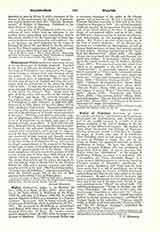

Walter of Chatillon, (GAUTIER DE LILLE, GUALTERUS DE INSULIS; also GAUTIER DE CHATILLON, GUALTERUS DE CASTILLIONE), poet in the second half of the twelfth century, b. at Lille; d. of the plague, probably at the city of Amiens, in the beginning of the thirteenth century. He studied at Paris, where his master was Etienne of Beauvais. Having afterwards settled at Chatillon, he changed his name, de Insulis, into that of de Castillione. From Chatillon, where he had charge of the schools, he went to Bologna to study law, and on his return to France was appointed secretary to Henry, Archbishop of Reims. He kept this office under Henry’s successor, William, who was Archbishop of Reims from 1176 to 1201. It was at that time that Walter wrote his “Alexandreid”, at the request of Archbishop William, to whom it is dedicated. His “Alexandreis, sive Gesta Alexandri Magni” is a Latin poem of 5464 hexameters in ten books, based on Curtius’s account of Alexander‘s expeditions. It shows a great familiarity with Virgil and the later Latin poets, but it is full of anachronia, one of the most startling being the Passion of Christ mentioned as something that had already taken place in the time of Alexander. In spite of its defects, however, this poem is considered superior to those composed at that time and at the end of the thirteenth century; it was even preferred to the “Aeneid” for school work. The well-known hexameter, “Incidit in Scyllam qui vult vitare Charybdim” (He falls into Scylla’s jaws who would escape Charybdis), is taken from the “Alexandreid”. Other works of his are: “Libelli tree contra Judaeos in dialogi formam conscripti”, published by Casimir Oudin in his collection, “Veterum aliquot Galliae et Belgii scriptorum opuscula” (Leyden, 1692), and “De SS. Trinitate tractatus”, published by Bernard Pez in his “Anecdota”.
P. J. MARIQUE

